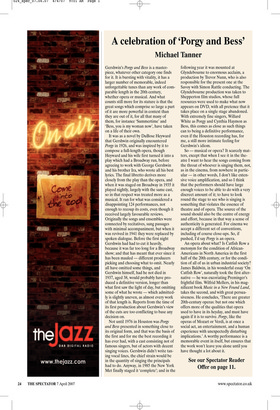A celebration of ‘Porgy and Bess’
Michael Tanner
Gershwin’s Porgy and Bess is a masterpiece, whatever other category one finds for it. It is bursting with vitality, it has a larger number of memorable, indeed unforgettable tunes than any work of comparable length in the 20th century, whether opera or musical. And what counts still more for its stature is that the great songs which comprise so large a part of it are more powerful in context than they are out of it, for all that many of them, for instance ‘Summertime’ and ‘Bess, you is my woman now’, have taken on a life of their own.
It was as a novel by DuBose Heyward that Gershwin originally encountered Porgy in 1926, and was inspired by it to compose a full-length opera, though Heyward and his wife first turned it into a play which had a Broadway run, before agreeing to work with George Gershwin and his brother Ira, who wrote all his best lyrics. The final libretto derives more closely from the play than the opera, and when it was staged on Broadway in 1935 it played nightly, largely with the same cast, so in that respect was treated more as a musical. It ran for what was considered a disappointing 124 performances, not enough to recoup its costs, even though it received largely favourable reviews. Originally the songs and ensembles were connected by recitatives, sung passages with minimal accompaniment, but when it was revived in 1941 they were replaced by spoken dialogue. Before the first night Gershwin had had to cut it heavily, because it was far too long for a Broadway show; and that has meant that ever since it has been mauled — different producers picking and choosing what to omit. Nearly all have omitted some things, and Gershwin himself, had he not died in 1937, aged 38, would probably have produced a definitive version, longer than what first saw the light of day, but omitting some of what he wrote — which admittedly is slightly uneven, as almost every work of that length is. Reports from the time of its first production about Gershwin’s view of the cuts are too conflicting to base any decision on.
Not until 1976 in Houston was Porgy and Bess presented in something close to its original form, and that was the basis of the first and for me the best recording it has ever had, with a cast consisting not of famous singers, but of actors with decent singing voices. Gershwin didn’t write taxing vocal lines, the chief strain would be in the quantity of singing the principals had to do. Anyway, in 1985 the New York Met finally staged it ‘complete’; and in the following year it was mounted at Glyndebourne to enormous acclaim, a production by Trevor Nunn, who is also responsible for the present one at the Savoy with Simon Rattle conducting. The Glyndebourne production was taken to Shepperton film studios, whose full resources were used to make what now appears on DVD, with all pretence that it takes place on a single stage abandoned. With extremely fine singers, Willard White as Porgy and Cynthia Haymon as Bess, this comes as close as such things can to being a definitive performance, even if the Houston recording has, for me, a still more intimate feeling for Gershwin’s idiom.
So — musical or opera? It scarcely matters, except that when I see it in the theatre I want to hear the songs coming from the throat of whoever is singing them, not, as in the cinema, from nowhere in particular — in other words, I don’t like extensive voice amplification, and so I think that the performers should have large enough voices to be able to do with a very discreet amount of it; to have to look round the stage to see who is singing is something that violates the essence of theatre and of opera. The source of the sound should also be the centre of energy and effort, because in that way a sense of authenticity is generated. For cinema we accept a different set of conventions, including of course close-ups. So, if pushed, I’d say Porgy is an opera.
An opera about what? Is Catfish Row a metonym for the condition of AfricanAmericans in North America in the first half of the 20th century, or for the condition of all of us in urban industrial society? James Baldwin, in his wonderful essay ‘On Catfish Row’, naturally took the first alternative — he was excoriating Preminger’s frightful film. Wilfrid Mellers, in his magnificent book Music in a New Found Land, takes the second, and with great persuasiveness. He concludes, ‘There are greater 20th-century operas: but not one which offers more of the qualities that opera used to have in its heyday, and must have again if it is to survive. Porgy, like the operas of Mozart or Verdi, is at once a social act, an entertainment, and a human experience with unexpectedly disturbing implications.’ A worthy performance is a memorable event in itself, but ensures that the work won’t leave you alone until you have thought a lot about it.
See our Spectator Reader Offer on page 11.


































































 Previous page
Previous page